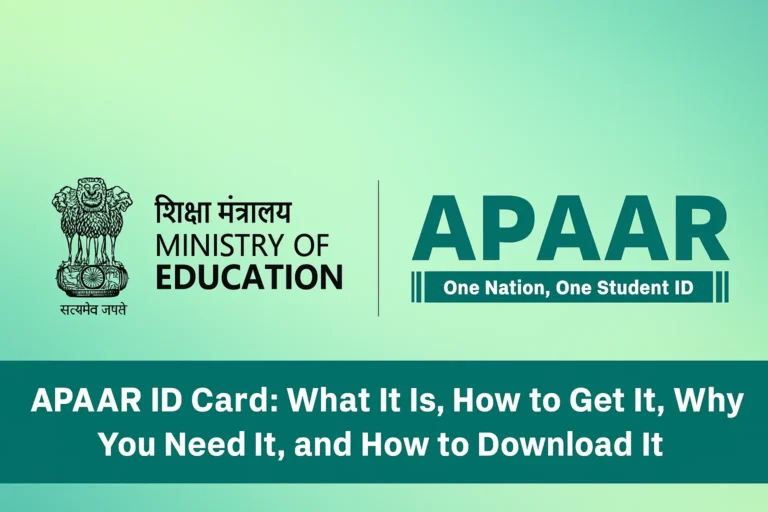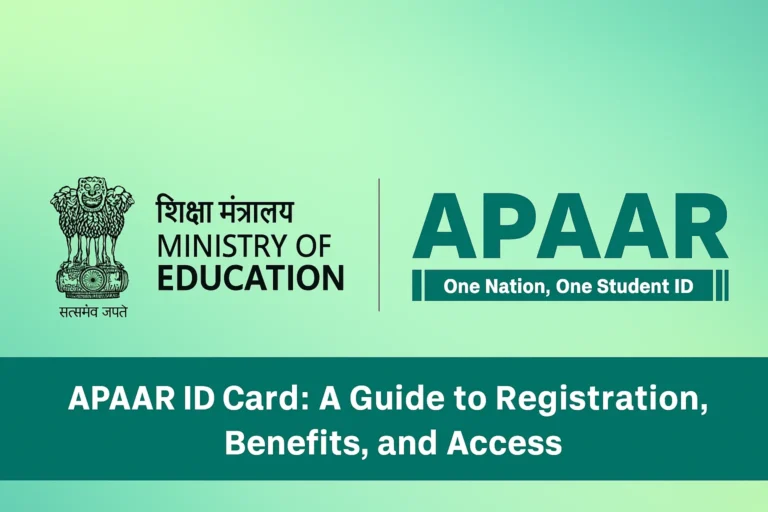Does APAAR ID Work for Non-Formal Education? Update 2025
The APAAR ID (Automated Permanent Academic Account Registry) is a big step toward digitalizing student records in India. It works as a lifelong academic identity under the “One Nation, One Student ID” initiative. While it is widely used in schools and colleges, many learners and educators are now asking: Does it also apply to non-formal education?
In this article, we’ll dive deep into what non-formal education is, how the APAAR ID applies to it, and the exciting possibilities for the future

Understanding Non-Formal Education
Non-formal education refers to learning outside the traditional school or university system. This includes skill development programs, vocational training, workshops, online courses, and adult education classes. In 2025, such flexible learning paths are becoming more important than ever.
APAAR ID and Its Role in Non-Formal Education
Currently, APAAR ID is designed mainly for formal academic institutions. However, discussions are underway to extend its scope to skill-based and vocational programs. This shift would allow learners from non-formal education backgrounds to enjoy the same benefits as regular students.
Benefits of Including Non-Formal Education in APAAR ID
Centralized Records for Skills
Learners can store certificates from workshops and training sessions alongside school records, making non-formal education achievements more credible.
Recognition of Diverse Learning
By integrating non-formal education, APAAR ID could give equal value to skills gained outside classrooms.
Easier Access to Jobs and Opportunities
Employers would be able to verify not just degrees but also short courses or vocational training completed through non-formal education.
Challenges Ahead
Lack of standardized systems across non-formal education providers
Need for digital adoption in small training centers
Ensuring data security for independent learners
What Makes APAAR ID Different from Traditional IDs
APAAR ID is a lifelong academic identity that securely stores records in digital form. Unlike traditional paper-based IDs, it follows the student throughout their learning journey.
Why Learners Outside Formal Schools Matter
Millions of learners gain knowledge through vocational courses, workshops, and short training programs. Recognizing this segment ensures equal opportunities for all types of learners.
Government Vision for Expanding APAAR ID
India’s education reforms are moving toward a unified system where all learning—whether formal or skill-based—gets recorded. Expanding APAAR ID is part of this long-term vision.
How Employers Benefit from Wider APAAR ID Use
When APAAR ID includes diverse skills, employers can quickly verify candidate achievements, reducing fraud and hiring delays.
Global Trend: Linking Skills to Digital IDs
Many countries are adopting digital student IDs that also recognize flexible learning paths. India is expected to follow this global trend.
Impact on Lifelong Learning
By integrating vocational and skill-based achievements, APAAR ID could encourage continuous learning at all ages, not just during school years.
The Future of APAAR ID in 2025 and Beyond
As India focuses on lifelong learning, it is highly likely that non-formal education will be linked to APAAR ID in the near future. This would create a unified record for every learner, no matter where or how they study.
FAQs
Final Thoughts
APAAR ID is already transforming formal education, but expanding it to cover non-formal education could be a game-changer. In 2025, this integration would ensure that every skill, certificate, and achievement—whether from a classroom or a workshop—gets recognized and valued.





